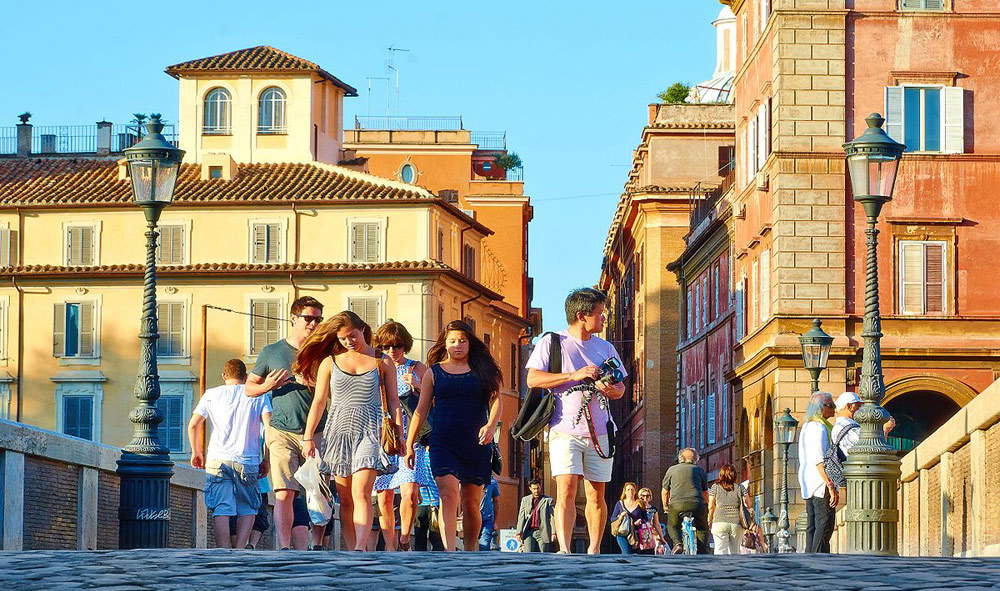We stand with the specialized tour guides
The news has not been reported by national newspapers and has been discussed exclusively by insiders, but the importance of the matter is considerable, so it is worth talking about. As we learn from industry information sites, the Regional Administrative Court of Lazio has annulled the decrees of the Ministry of Cultural Heritage that imposed limitations on the exercise of the profession of tourist guide(April 7, 2015 and December 11, 2015): in particular, the measures that identified sites of special interest (3,176 throughout the country) that required a special qualification in order to exercise the profession within them were considered illegitimate. The reason? The Regional Administrative Court found that the limits imposed by ministerial decrees violated European rules on competition and the movement of workers.
 |
| Tourists in Rome. Photo credit. |
What changes now? Law 97 of August 6, 2013, is back in force, which recognizes the qualification for the profession of tourist guide as valid throughout the entire national territory, and likewise foreign tourist guides who have obtained their qualification in their countries of origin will also be able to exercise their profession on Italian territory, given the regime of freedom to provide services recognized by the European Union.
It has to be said that if they wanted to liberalize the profession of tour guide, they most likely chose the wrong path, and we stand on the side of all those specialized tour guides, profound connoisseurs of their territory, who express their concern with the decision of the Lazio Regional Administrative Court. The goal of the legislators’ action should always be to protect the consumer: the Lazio Regional Administrative Court’s ruling (number No. 02831/2017 of January 31, 2017, published on February 24) instead seems to go in the opposite direction, because in a particularly delicate sector, where the consumer is none other than the tourist who relies on a professional who has to acquaint him or her with a territory, there is a risk of creating a reality where the ones who will lose out will be, precisely, the end customers, the tourists. In fact, no one will be able to prevent tourists from being led to discover a city by a guide who comes from a whole other area and perhaps has only studied in books the subjects he or she will then go on to explain to travelers, just as no one will be able to prevent foreign tour operators from relying on their guides rather than local ones. We should also not forget that “being a tour guide” is not just about knowing a work of art or having knowledge of the history of a church or building. A tour guide knows the habits of the locals, knows how to recommend restaurants, hotels, businesses, knows which areas to avoid in a city, can best organize the logistical aspects: in short, living the place firsthand, he can only know it better than anyone else.
Of course: it is to be expected that the most capable will continue to work as they have always worked, but it is equally to be expected that such a liberalization regime may also result in downwardly revised prices that could cause a general decline in quality, with tour guides who, in order to adapt to the market, in addition to adjusting their rates to match the competition that will be increasingly pressing, will have to invest less time in studying, training and gaining experience in the field, and launch themselves with greater thrust into marketing actions to retain clients who will no longer be required, as the law intended, to go to the guides on site, but will be able to choose who they prefer (and perhaps they could bring along a guide “from home”).
We are convinced that professionalism will continue to be recognized by discerning tourists. However, there is a risk that the TAR’s decision will be to the disadvantage (as well as, needless to say, to many operators in the sector) especially of consumers: the latter will be at the mercy of a market that, in essence, will no longer have stringent rules. We agree that the profession needed to be reformed: becoming a tour guide was now an almost unattainable dream for many and there was a risk of corporativism, but the solution to these problems is not the other extreme either. We are therefore on the side of the specialized tour guides, simply because we are on the side of the interests of those who travel and those who want to know, and those who still intend to accompany those who travel and those who want to know in a healthy, correct, useful and professional way.
Warning: the translation into English of the original Italian article was created using automatic tools. We undertake to review all articles, but we do not guarantee the total absence of inaccuracies in the translation due to the program. You can find the original by clicking on the ITA button. If you find any mistake,please contact us.




























